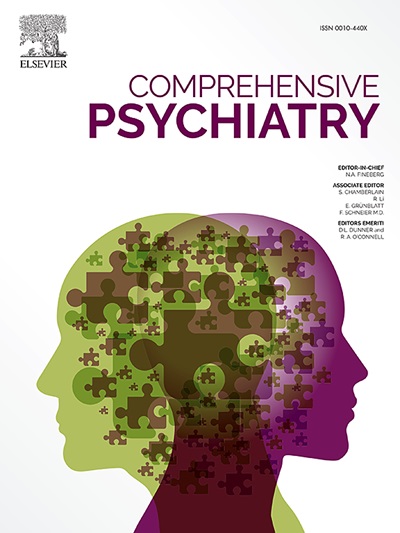强迫症门诊患者治疗的充分性。
IF 4.2
2区 医学
Q1 PSYCHIATRY
引用次数: 0
摘要
摘要研究强迫症(OCD)患者在转诊至强迫症专科中心之前是否接受了充分的药物治疗:我们对2016年至2023年间在荷兰一家学术门诊中心就诊的强迫症患者进行了回顾性病历审查。我们使用耶鲁-布朗强迫症量表(Yale-Brown Obsessive-Compulsive Scale)收集了患者的年龄、性别、病情严重程度、病程、合并症、既往药物治疗和心理治疗等数据。根据国际治疗指南,我们计算了接受一种 SSRI、两种或两种以上 SSRI、氯米帕明和/或抗精神病药物增强治疗的患者百分比。我们使用多元回归法分析了患者和疾病特征是否会影响治疗的充分性:入院前,76%的患者至少服用过一种SSRI,35%的患者至少服用过两种SSRI。只有 29% 的患者服用过大剂量的 SSRI,4% 的患者至少服用过两种大剂量的 SSRI。服用氯米帕明和抗精神病药物的患者不到三分之一。只有 3% 的转诊患者遵循了指南建议的所有治疗步骤。虽然绝大多数患者都接受过某种形式的心理治疗,但只有少数患者接受过暴露和反应预防治疗。多元回归显示,病程长短和是否接受过心理治疗是药物治疗是否充分的独立调节因素:结论:强迫症患者并没有按照药物治疗指南得到充分治疗。药物治疗不当可能会导致病程延长、康复效果不理想以及不必要的社会成本。进一步的研究可以澄清患者和护理人员面临的障碍,促进改善对强迫症的药物治疗。本文章由计算机程序翻译,如有差异,请以英文原文为准。
Adequacy of treatment in outpatients with obsessive-compulsive disorder
Objective
To examine whether patients with obsessive-compulsive disorder (OCD) are adequately treated with pharmacotherapy before referral to a specialized center for OCD.
Methods
We performed a retrospective chart review of patients with OCD who were seen for intake at an academic outpatient center in The Netherlands between 2016 and 2023. We collected data on age, gender, illness severity using the Yale-Brown Obsessive-Compulsive Scale, duration of illness, comorbidity and past pharmacotherapy and psychotherapy. Following the international treatment guidelines, we calculated percentages of patients treated with one SSRI, two or more SSRIs, clomipramine and/or antipsychotic augmentation treatments. Using multiple regression, we analyzed if patient and illness characteristics influenced the adequacy of treatment.
Results
We included 673 patients with an average YBOCS score of 27. 76 % had taken at least one SSRI, and 35 % at least two SSRIs before admission. Only 29 % received a high SSRI-dose and 4 % had taken at least two SSRIs in high dose. Clomipramine and antipsychotics augmentation had been taken by less than one-third of patients. Only 3 % of referred patients followed all guideline-recommended treatment steps. Although the vast majority of patients had received some form of psychotherapy, a minority had received exposure and response prevention treatment. Multiple regression showed that illness duration and having received psychotherapy were independent moderators of the adequacy of pharmacological treatment.
Conclusion
Patients with OCD are not being treated adequately according to the pharmacological guidelines. Poor pharmacological treatment may lead to increased duration of illness, suboptimal recovery and unnecessary societal costs. Further research could clarify barriers for patients and caregivers, and facilitate improvement of pharmacological treatment for OCS.
求助全文
通过发布文献求助,成功后即可免费获取论文全文。
去求助
来源期刊

Comprehensive psychiatry
医学-精神病学
CiteScore
12.50
自引率
1.40%
发文量
64
审稿时长
29 days
期刊介绍:
"Comprehensive Psychiatry" is an open access, peer-reviewed journal dedicated to the field of psychiatry and mental health. Its primary mission is to share the latest advancements in knowledge to enhance patient care and deepen the understanding of mental illnesses. The journal is supported by a diverse team of international editors and peer reviewers, ensuring the publication of high-quality research with a strong focus on clinical relevance and the implications for psychopathology.
"Comprehensive Psychiatry" encourages authors to present their research in an accessible manner, facilitating engagement with clinicians, policymakers, and the broader public. By embracing an open access policy, the journal aims to maximize the global impact of its content, making it readily available to a wide audience and fostering scientific collaboration and public awareness beyond the traditional academic community. This approach is designed to promote a more inclusive and informed dialogue on mental health, contributing to the overall progress in the field.
 求助内容:
求助内容: 应助结果提醒方式:
应助结果提醒方式:


